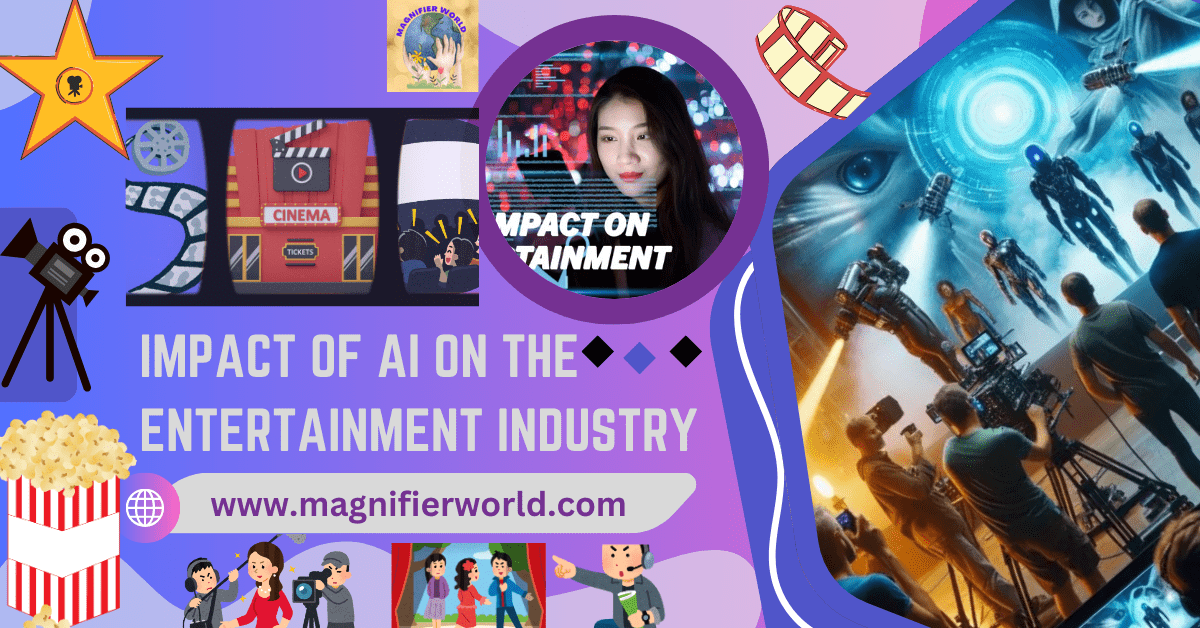The Role of AI in the Entertainment Industry
Enhancing Content Creation
The impact of AI on the entertainment industry has revolutionized content creation. Artificial intelligence is reshaping how content is created and consumed, revolutionizing the entertainment landscape. With AI-powered tools, writers, filmmakers, and artists can now streamline the creative process.
For instance, scriptwriting software uses advanced algorithms to analyze audience preferences, crafting storylines that resonate deeply with viewers.
The growing impact of AI on the entertainment industry is reshaping audience engagement. Meanwhile, AI-enhanced animation techniques enable the creation of detailed and visually stunning graphics, often at a fraction of traditional production costs.
Key Takeaways: AI’s Influence in Entertainment
- Content generation becomes faster and more accessible with AI.
- Audience engagement improves through personalized recommendations and interactive experiences.
- AI streamlines production processes, making filmmaking more efficient.
- Immersive technologies powered by AI transform storytelling into unique experiences.
- Creative boundaries are expanded as AI introduces new tools and techniques.
“AI’s ability to generate entire dialogues or plots based on minimal input empowers creators to experiment without the constraints of time-intensive manual work. Beyond that, virtual environments crafted using generative AI are elevating storytelling by offering lifelike settings that immerse audiences. “
This democratization of content creation ensures that emerging creators without access to massive budgets can still produce high-quality entertainment, making the industry more inclusive.
Revolutionizing Audience Engagement
AI has profoundly altered how creators connect with their audiences, tailoring experiences to individual preferences. The growing impact of AI on the entertainment industry is reshaping audience engagement.
Recommendation engines, as seen on platforms like Netflix, Hulu, and Spotify, utilize machine learning models to analyze viewing habits and suggest content that aligns with user tastes. The impact of AI on the entertainment industry has revolutionized content creation.
This personalization not only boosts user retention but also enhances satisfaction, ensuring audiences always find something they enjoy.
Furthermore, AI-generated influencers, such as virtual avatars, are now bridging the gap between the digital and physical worlds. These entities engage directly with fans, hosting live streams or responding to comments in real-time.
The integration of AI into marketing campaigns has also revolutionized how trailers and promotions are designed, with algorithms analyzing what triggers emotional responses.
This leads to campaigns that more effectively capture viewers’ attention, making audience engagement a seamless, immersive experience.
Transforming Production and Post-Production
Streamlining Filmmaking Processes
The entertainment industry is leveraging AI to simplify production workflows and reduce costs. In the realm of filmmaking, AI-assisted tools are optimizing processes such as storyboarding, casting, and even on-set adjustments.
For example, AI systems can analyze thousands of audition tapes to identify actors who best fit specific roles, saving directors hours of manual review. During production, virtual simulations powered by AI allow for the creation of intricate sets and environments, eliminating the need for costly physical builds.
These simulations not only save resources but also expand creative possibilities, enabling filmmakers to bring unimaginable worlds to life. The impact of AI on the entertainment industry has revolutionized content creation.
AI also contributes to real-time editing, where tools like Adobe Sensei assist in color grading, audio balancing, and special effects application, drastically reducing turnaround times.
Enhancing Visual Effects
AI is redefining how visual effects (VFX) are produced, offering both speed and innovation. Traditional methods of creating lifelike effects required labor-intensive modeling and animation.
With AI, systems like generative adversarial networks (GANs) can quickly produce hyper-realistic visuals, from alien landscapes to complex weather phenomena.
Deepfake technology, though controversial, has become a powerful storytelling tool, allowing for digital de-aging of actors or recreating historical figures.
Moreover, AI-powered motion capture techniques now enable filmmakers to capture nuanced expressions and movements, adding unprecedented depth to animated characters. The growing impact of AI on the entertainment industry is reshaping audience engagement.
These advancements not only push creative boundaries but also ensure that audiences are captivated by highly immersive storytelling experiences.
AI in Real-Time Content Creation
The impact of AI on the entertainment industry has revolutionized content creation. One of AI’s most impressive capabilities is its role in real-time content creation. Filmmakers and production teams are using AI to develop characters, scenes, and even scripts.
For example, AI-powered tools allow directors to preview complex scenes before shooting, reducing production time significantly. This helps creators focus on crafting compelling narratives, while AI handles repetitive, labor-intensive tasks like editing and CGI integration.
Enhanced Audience Engagement
AI’s impact is evident in how audiences experience entertainment today. Advanced algorithms analyze user preferences to provide personalized recommendations, ensuring each user gets tailored content.
In gaming, AI-driven non-player characters (NPCs) adapt their behavior based on a player’s choices, creating immersive and dynamic gameplay. This fosters greater engagement and boosts user satisfaction in the long run. The impact of AI on the entertainment industry includes enhancing personalization in storytelling.
Personalization and Immersive Technologies
Redefining Interactive Storytelling
Interactive storytelling is experiencing a revolution, thanks to AI-driven immersive technologies like augmented reality (AR) and virtual reality (VR). The impact of AI on the entertainment industry has revolutionized content creation.
These tools transport users into the heart of narratives, allowing them to interact with the story in real time. AI algorithms play a crucial role in adapting these experiences to user input, creating a sense of agency and personal connection.
For example, AI-powered games and VR experiences modify plotlines or outcomes based on a player’s decisions, making each playthrough unique.
This personalization deepens engagement, transforming passive viewers into active participants. Beyond gaming, platforms like Oculus and Holoride are exploring how interactive storytelling can reshape education and training, further expanding its applications.

Personalized Music and Art
AI has made significant strides in the realms of music and visual art, crafting personalized experiences for consumers. In music, AI systems such as AIVA or OpenAI’s Jukebox can generate original compositions, blending genres and styles to create tracks tailored to specific moods or themes.
These tools are especially popular in advertising and independent filmmaking, where bespoke soundtracks can elevate storytelling. Visual artists are also embracing AI tools like DeepArt or DALL·E, which generate unique pieces based on user inputs. The impact of AI on the entertainment industry includes enhancing personalization in storytelling.
These applications not only push the creative envelope but also enable mass personalization, allowing every consumer to enjoy a uniquely crafted artistic experience. The impact of AI on the entertainment industry has revolutionized content creation.
Benefits and Challenges of AI Integration
Benefits of AI Adoption
The benefits of AI in entertainment are extensive, revolutionizing how content is created and consumed. AI enhances efficiency, automating repetitive tasks so creators can focus on the artistic aspects of their work.
This automation also results in cost savings, as fewer resources are needed to achieve the same results. The impact of AI on the entertainment industry includes automating repetitive creative tasks.
Moreover, AI democratizes creativity by providing tools to creators who may lack traditional resources, enabling a diverse range of voices to enter the industry.
AI’s ability to analyze audience data in real time allows for dynamic decision-making, ensuring content resonates with its intended audience. These advancements make AI an invaluable ally in fostering innovation and inclusivity within the entertainment sector.
Addressing Potential Drawbacks
Despite its advantages, integrating AI into entertainment is not without its challenges. Ethical concerns arise with technologies like deepfakes, which can be misused to spread misinformation or violate privacy.
The impact of AI on the entertainment industry has revolutionized content creation. Furthermore, automation threatens to displace workers in roles such as editing, animation, and even acting.
This underscores the need for regulations and policies that ensure AI adoption remains ethical and equitable. Additionally, the reliance on AI for decision-making raises concerns about creative homogenization, where data-driven decisions prioritize profitability over artistic integrity.
Addressing these challenges is essential to ensuring that AI enriches the industry without compromising its core values. The impact of AI on the entertainment industry includes enhancing personalization in storytelling.
How AI is Transforming Entertainment: Innovation Across the Spectrum
The entertainment industry has always been a hub of innovation, but the incorporation of artificial intelligence (AI) is taking it to new heights.
By blending creativity with technology, AI is streamlining processes, enhancing audience experiences, and redefining how we interact with content. From blockbuster films to personal music playlists, AI is leaving an indelible mark on every aspect of the entertainment world.
AI in Scriptwriting and Production
The early stages of content creation, such as scriptwriting, have seen significant changes thanks to AI-powered tools. The impact of AI on the entertainment industry has revolutionized content creation.
These tools help screenwriters brainstorm ideas, refine plots, and even write dialogue that matches the desired tone and genre. The impact of AI on the entertainment industry is seen in tools that assist with animation.
In production, AI assists with tasks like scheduling, budgeting, and managing logistics, which reduces errors and saves both time and money.
By automating repetitive tasks, professionals can focus on the creative aspects, ensuring that the final product stands out. The impact of AI on the entertainment industry includes automating repetitive creative tasks.
Revolutionizing Visual Effects and Animation
In the world of visual effects (VFX) and animation, AI is pushing the boundaries of what’s possible. AI algorithms are now used to create hyper-realistic characters, lifelike environments, and seamless special effects.
For instance, deep learning technology can generate stunning visuals in a fraction of the time it took before. The impact of AI on the entertainment industry has revolutionized content creation.
Animators and filmmakers are leveraging AI to create immersive worlds that captivate audiences while staying on budget. This combination of creativity and technology has led to unprecedented storytelling opportunities.
Personalized Content Recommendations
One of the most visible impacts of AI is in content delivery. Streaming platforms like Netflix and Spotify use AI to analyze user behavior and preferences, providing personalized recommendations that keep audiences engaged. The impact of AI on the entertainment industry is seen in tools that assist with animation.
These platforms rely on sophisticated machine learning algorithms to predict what users are likely to enjoy, creating a seamless and tailored experience. This not only improves viewer satisfaction but also increases platform loyalty.
AI-Enhanced Marketing and Audience Engagement
AI is also transforming how entertainment companies market their products. Predictive analytics helps marketers identify audience trends, create targeted campaigns, and optimize advertising efforts. The impact of AI on the entertainment industry has revolutionized content creation.
For example, AI-driven chatbots and virtual assistants engage with fans in real-time, offering personalized interactions that deepen their connection with a brand. Social media platforms use AI to amplify viral content, ensuring that new releases receive maximum visibility.
Virtual Reality and Immersive Experiences
Virtual reality (VR) and augmented reality (AR) are rapidly becoming staples of modern entertainment, with AI playing a critical role in their development.
AI enhances these immersive technologies by enabling real-time interactions, generating dynamic environments, and adapting experiences to user preferences.
Whether it’s a VR gaming experience or a virtual concert, AI is creating immersive worlds that blur the line between reality and imagination.
AI’s Role in Music and Sound Design
In the music industry, AI is composing songs, analyzing trends, and assisting artists in their creative journeys. Platforms like AIVA (Artificial Intelligence Virtual Artist) can create original compositions tailored to specific moods or themes.
In sound design, AI ensures precise audio mixing and enhances the overall listening experience.
This innovation is helping musicians reach new heights while catering to their audiences’ evolving tastes. The impact of AI on the entertainment industry has revolutionized content creation.
AI’s Benefits for Entertainment
- Efficiency Boost: AI reduces time spent on repetitive tasks, allowing for a focus on creativity.
- Enhanced Visuals: Advanced VFX and animation tools enable unmatched storytelling.
- Personalized Experiences: Content is now tailored to individual preferences for greater engagement.
- Cost-Effective Solutions: AI streamlines production, reducing expenses significantly.
- Innovative Marketing: Data-driven insights create more impactful campaigns.
Conclusion: The Future is AI-Powered
AI is undeniably transforming the entertainment industry, offering groundbreaking innovations that benefit both creators and consumers.
As AI tools evolve, they will continue to redefine what’s possible in entertainment, fostering a future where creativity and technology coexist harmoniously.
AI’s influence on the entertainment industry is just beginning, with limitless potential to come. As technology continues to evolve, the synergy between creativity and AI will lead to even greater innovations.
By embracing these advancements, the entertainment world can deliver experiences that are more immersive, personalized, and impactful than ever before.
The growing impact of AI on the entertainment industry is reshaping audience engagement. AI isn’t just a tool—it’s becoming an integral part of the creative process, shaping the future of how stories are told and consumed. The impact of AI on the entertainment industry is seen in tools that assist with animation.
FAQs
- How is AI used in content creation?
AI helps generate scripts, visuals, and music, automating parts of the creative process. - What impact does AI have on audience engagement?
AI enhances engagement through personalized recommendations and experiences tailored to user preferences. - Can AI replace human jobs in entertainment?
While AI can automate tasks, it cannot fully replicate the creativity and emotion humans bring. - What are some challenges of AI in entertainment?
Ethical concerns, misuse of deepfakes, and job displacement are key challenges to address. - Is AI changing the way we consume entertainment?
Yes, AI-driven tools like VR, AR, and personalized recommendations are transforming consumption patterns.










